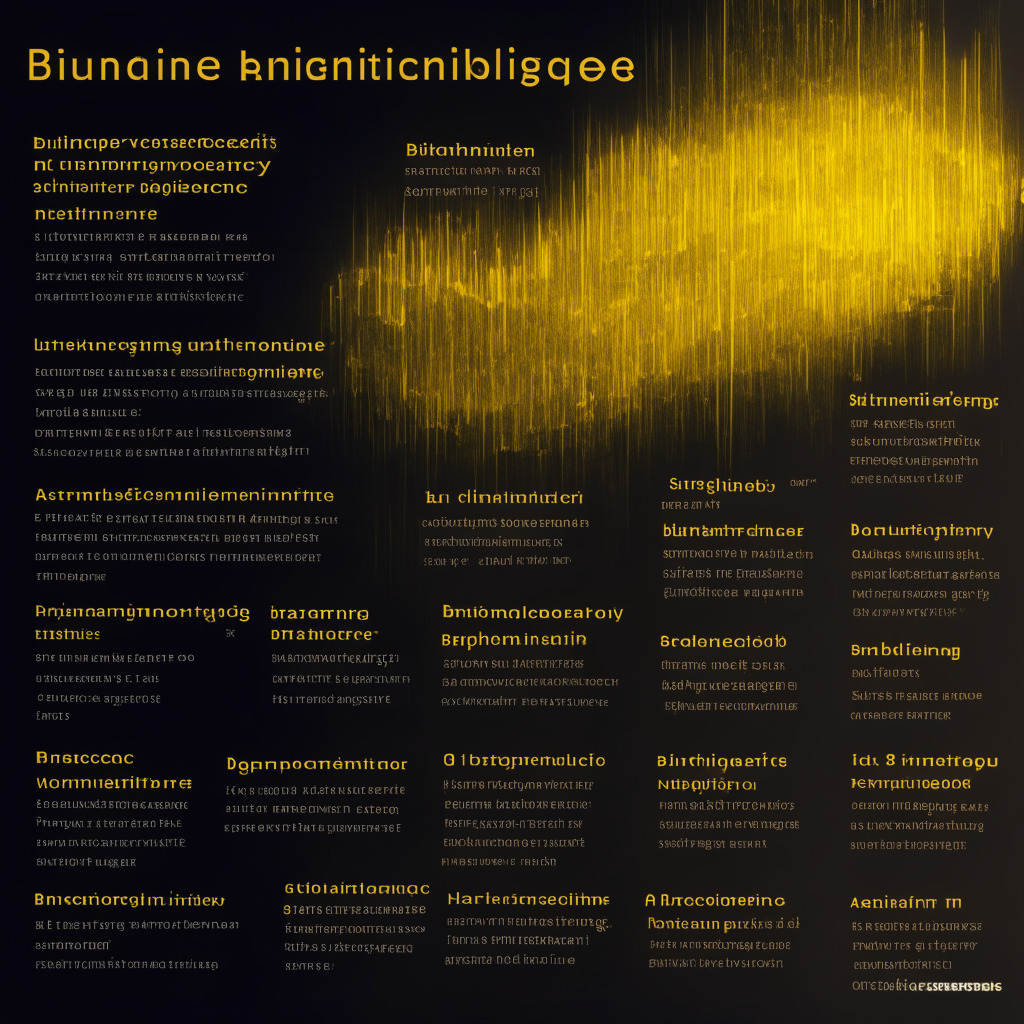Do Kwon, the founder of the failed Terra blockchain project, faces an extended detention in Montenegro amidst South Korea’s extradition request. Kwon is facing eight counts of fraud, including securities, wire, and commodities fraud. The case highlights the potential for similar incidents and raises debates on the balance between market innovation and tighter control to prevent fraud in the crypto space.
Search Results for: AUD
Crypto Lending Firm Abra Accused of Fraud: Implications for the Future of Crypto Lending Platforms
Texas regulators accuse crypto lending firm Abra, which once managed over $116 million in assets, of securities fraud and insolvency. Abra allegedly concealed financial information, defaulted on loans, and deceptively sold investment products under affiliates Abra Earn and Abra Boost. The outcome of these allegations could significantly impact crypto lending platforms and emphasize the importance of transparency and regulatory compliance.
Abra Accusations: Securing Crypto Investments Amidst Fraud and Insolvency Claims
The Texas State Securities Board accuses crypto lender Abra and founder William Barhydt of misleading the public, securities fraud, and insolvency. Regulators allege Abra offered investments with materially misleading statements targeting Texas investors and secretly transferred assets to Binance Holdings Limited. The safety of investors and users is at risk, and authorities aim to protect them by bringing these irregularities to public attention.
FTX Co-Founder’s Trial: Fraud or Mismanagement Debacle in Crypto Exchange Collapse
US prosecutors proceed with the trial of FTX co-founder Sam Bankman-Fried on original criminal charges amid ongoing litigations in The Bahamas. The case will examine the relationship between exchange founders, risk management, and the future of cryptocurrency exchange regulations, providing insights for entrepreneurs, enthusiasts, and detractors alike.
FPG Cyberattack: A Wake-Up Call on Cryptocurrency Security and Audits
The recent cyberattack on Floating Point Group, resulting in a loss of $15-$20 million in crypto, raises concerns regarding the effectiveness of current security measures, certifications, and audits in protecting digital assets. As the industry evolves, collaboration and comprehensive security strategies are crucial to address the ever-present challenges of securing cryptocurrencies.
Binance Faces Accusations: Understanding Fraud Claims, Market Manipulation, and Regulatory Challenges
Binance and its CEO, Changpeng “CZ” Zhao, face accusations of fraud and market manipulation, potentially affecting the reputation of the crypto industry giant. Concerns arise for individual investors who could suffer financial losses due to such market manipulation, highlighting the need for transparent regulations in the crypto space.
FTX Founder’s Lingering Legal Battle: Fraud Charges, Extradition, and Crypto Implications
FTX founder Sam Bankman-Fried faces a potential lingering legal battle as his attorneys suggest further charges could significantly delay fraud proceedings. Besides wire fraud and money laundering allegations, additional charges may result from the U.S. Department of Justice, impacting the crypto community and related businesses.
Digital Yuan Adoption Surge: Protecting Citizens from Emerging Scams and Fraudsters
Chinese police report an increase in digital yuan-themed scams amidst the CBDC adoption drive. Fraudsters create authentic-looking apps using digital yuan logos to dupe citizens into transferring their money to illegitimate accounts. Authorities emphasize cybersecurity measures and public awareness campaigns to mitigate these risks while urging individuals to remain vigilant and understand potential risks associated with new technologies.
DeFi Fraud Lawsuit: Curve Finance CEO Faces Allegations, Exposing Regulatory Challenges
This excerpt discusses a fraud lawsuit filed against Michael Egorov, CEO of Curve Finance, by venture capital firms alleging misappropriation of trade secrets and defrauding them out of nearly $1 million. The case highlights the ongoing challenge of enforcing regulations and ensuring legal accountability across decentralized platforms in the world of DeFi.
Saudi Oil Production Cut Fuels Meme Coin Market: $HABIBI, $HARAM, and $WSM’s Rise and Risks
Amidst a resurgence of interest in meme coin markets, $HABIBI and $HARAM tokens display impressive growth. Investors search for the next opportunity, with Wall Street Memes ($WSM) raising over $4.9 million during the presale. However, crypto investments carry high volatility and risk, urging thorough research prior to investing.
FTX Fraud Case & Booming AI Investment: Clash of Legal Battles and Market Opportunities
Former FTX CEO Sam Bankman-Fried’s trial faces frustrations due to late production of crucial evidence, impacting defense team’s preparation. Meanwhile, FTX investors eye potential windfall in booming AI sector, cashing out shares in AI startup Anthropic.
Cryptocurrencies and Arab World: Saudi Arabia’s BRICS Bank Bid, Opportunities, and Challenges
Cryptocurrencies gain traction in the Arab world, with Saudi Arabia potentially joining the New Development Bank (NDB), opening new funding channels and fostering cryptocurrency adoption. However, geopolitical uncertainties and strategic regulations must be navigated to ensure sustainable success.
Ex-Vikings Owner Sentenced in Crypto Fraud: Unveiling the Dark Side of Decentralized Finance
Former Minnesota Vikings part-owner Reggie Fowler has been sentenced to over six years in prison and ordered to forfeit $740M for his involvement in a large-scale cryptocurrency scheme as a shadow bank. The case highlights risks of operating in an unregulated and decentralized cryptocurrency market, prompting calls for improved transparency, regulation, and security.
Blockchain Revolution in Banking Meets AI-Generated Fraud: Unleashing Potential or Unraveling Trust?
JPMorgan collaborates with six Indian banks to enable real-time interbank dollar settlements on its blockchain-based platform, Onyx. However, concerns emerge over AI-generated fraud in the crypto and blockchain sectors. Meanwhile, the UK’s APPG proposes recommendations for crypto regulation, and the US Treasury Department’s sanctions on Tornado Cash face legal challenges.
Terra CEO Do Kwon’s Second Bail Release: Impact on Crypto Markets and Fraud Allegations
Terraform Labs founder Do Kwon and former CFO Han Chang-joon may be released on bail for a second time following a Montenegro court ruling. Both are facing charges for attempting to leave Montenegro using forged travel documents and are also wanted in South Korea on fraud charges.
Crypto’s Regulatory Balance: Lessons from Influencer Danny Devan’s $1.2M Fraud Case
Social media influencer Denish Sahadevan pleaded guilty to money laundering using cryptocurrency, obtaining over $1.2 million in government relief loans. His actions fuel the debate between cryptocurrency regulation proponents and critics, highlighting the need for a delicate balance between oversight and innovation.
AI in Blockchain Security: Potential and Limitations in Smart Contract Audits
Blockchain security company OpenZeppelin tested OpenAI’s GPT-4 model to discover smart contract vulnerabilities. Despite a reasonable success rate, the AI lacked reliable reasoning for security purposes, emphasizing the need for human auditors in assessing blockchain security.
AI vs Human Auditors in Smart Contract Security: Efficiency, Limitations, and Future Prospects
Blockchain security firm OpenZeppelin tested AI’s capacity to replace human auditors in smart contract auditing using OpenAI’s ChatGPT-4. While the AI model solved 20 of 28 Ethernaut security challenges, it’s not yet ready to replace human auditors. However, AI can improve auditor efficiency and detect vulnerabilities, indicating a potential for tailored AI models to enhance Web3 security auditing.
Binance Australia’s AUD Suspension: Challenges, Options, and Future Outlook
Binance Australia discontinues AUD deposits, withdrawals, and trading pairs due to regulatory hurdles. Despite restrictions, users can still trade by converting AUD to USDT or using Binance’s P2P marketplace. The exchange is actively seeking an alternative partner to restore AUD services.
FTX Founder Fights Fraud Charges: The Role of Legal Advice and the Complex Crypto Landscape
FTX founder Sam Bankman-Fried faces fraud charges and plans to argue he relied on legal advice from law firm Fenwick & West. His defense requests government documents provided by the firm between 2017-2022 for his case preparation. The case highlights the complexities in the evolving cryptocurrency space and the importance of compliance and transparent communication with regulators.
SEC Crackdown on Influencer Fraud: Market Manipulation and Ensuring Transparency
The SEC is intensifying efforts to identify crypto influencers involved in promoting scams and manipulating token prices on social media. Former SEC Chief John Reed Stark warns of potential persecution and emphasizes that anti-fraud rules apply to all forms of price manipulation, including crypto-securities. Influencers must carefully vet projects, avoid price manipulation, and maintain transparency to ensure legal safety and trust.
Crackdown on Crypto Influencers: SEC Targets Fraudulent Promotions and Price Manipulation
Former SEC official John Reed warns social media influencers promoting and manipulating cryptocurrency prices that they will soon face anti-fraud regulations similar to those governing exchange-listed securities. The existing regulatory loopholes enabling fraudulent activities and price manipulation will likely close soon, as regulatory bodies like the SEC intensify their scrutiny.
Crackdown on South Korean Crypto Scams: Uncovering $350M Fraudulent Operations & Trust Issues
South Korean police dismantled two cryptocurrency scams worth $350 million, affecting hundreds of victims. The first case involved a “virtual fashion items” marketplace, luring 435 victims into investing $333 million. The second scam swindled investors out of $27 million. These incidents raise concerns over the commitment of crypto businesses to customer protection and the effectiveness of regulations.
Riot Platforms’ Surprising Auditor Switch: Delving into Crypto-Industry’s Complex Ties with Big Four
Bitcoin mining company Riot Platforms switches accounting firms, replacing Marcum with Deloitte, amidst concerns of large accounting firms’ hesitance towards providing services to crypto companies. This highlights a potential divide in how the Big Four firms approach the crypto industry.
CFTC Tackles Fraud in Crypto: Balancing Investor Protection and Innovation
The Commodity Futures Trading Commission (CFTC) filed a complaint against five individuals accused of fraudulently soliciting funds from over 170 people in a Bitcoin trading scheme. The Icomtech case highlights the challenges of regulating cryptocurrencies while nurturing innovation and maintaining investor safety.
Binance Axes AUD Trading Pairs amid Regulatory Scrutiny: How Will it Impact Crypto Landscape?
Binance, the world’s largest digital asset exchange, removes several trading pairs, including those involving the Australian Dollar (AUD), amid heightened regulatory scrutiny in Australia. This strategic move highlights the ongoing challenges the cryptocurrency industry faces while balancing innovation and compliance with a complex web of laws.
CoinDeal Scam Unraveled: Protecting Investors from Crypto Fraud and Hacks
The US Department of Justice charged a Nevada man for involvement in the CoinDeal investment scheme, deceiving 10,000 investors and extracting $45 million. The growing cryptocurrency market has seen a significant increase in scams, hacks, and illegal activities, with $4 billion in digital assets lost last year.
Saudi Pepe’s Surge: A Temporary Boom or Long-Term Growth? Pros, Cons & Alternatives
The Saudi Pepe (SAUDIPEPE) price recently witnessed an 85% surge, reviving hope in the meme coin’s potential. However, concerns over its long-term utility persist. Alternatively, crypto start-up yPredict is building an AI-powered trading signals platform, garnering attention and offering a more tangible investment option with its YPRED token.
FTX Embed Acquisition Drama: Scandal, Fraud, and the $220 Million Price Tag Debate
FTX faces a legal challenge over its $220 million acquisition of stock-clearing platform Embed, with allegations of insufficient due diligence and inflated prices. The exchange seeks to recover millions from insiders and executives amidst bankruptcy filing, raising questions about transparency in high-stakes acquisitions.
Binance AUD Suspension: Unveiling Crypto Market Vulnerabilities and the Need for Adaptability
The recent Binance suspension of AUD services highlights vulnerabilities and the need for adaptability within the cryptocurrency market. This incident emphasizes potential risks when relying on external service providers and reminds users of the importance of thorough research before investing.
First eAUD Foreign Exchange Transaction: Future of CBDCs and Pros-Cons Debate
Australia successfully completed its first foreign exchange transaction using eAUD, marking a milestone in the country’s central bank digital currency (CBDC) development. The eAUD transaction showcased quicker settlement and potential benefits over traditional FX, remittance networks, and fiat currencies. The ongoing pilot explores various eAUD use-cases, driving the world closer to CBDC integration in financial systems.
Lack of Audits and Independent Boards: Crypto Firms Risking Collapse?
A recent Bloomberg report reveals that numerous influential crypto firms do not work with external auditors and independent boards, raising questions about transparency and professionalism in the cryptocurrency space. This lack of regulation persists despite the high-profile collapse of the FTX exchange and Alameda Research due to poor management and misappropriation of funds.































